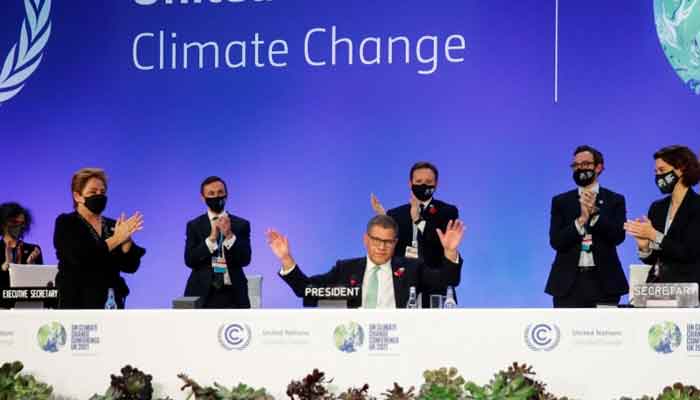The monster in the room: Plastics
Everything around us is contributing to the climate pandemic – our cars, our plastic ridden homes and offices, our phones, televisions and appliances, our plastic dabbas, bottles, shopping bags...
November 24, 2021

The way these Conferences of the Parties climate summits drag on from one venue to the other with an ever bigger fanfare, it’s not unrealistic to expect for the Glasgow text to have at least mentioned the monster in the room: plastics.
Given the watered down Glasgow Pact and the apology of the tearful COP26 President Alok Sharma at the conclusion of the summit, the mention of plastics would have been, if nothing else, a step towards convincing us that the global leadership was honest about wanting to kill the multi-headed hydra. Even a dishonorable mention would have been enough for this round.
Covering over 70% of the Earth's surface, the ocean is the largest life support system of the planet, and along with forests, is one of the two "lungs of the planet", working both as a thermostat and a carbon pump. And the biggest threat to our oceans right now is the unimaginable amount of plastic choking the very aquatic life that is responsible for more than 50% of the oxygen we breathe in.
While COP26 managed to rope in over 100 world leaders into promising an end to deforestation by 2030, nothing has come out on the health of our oceans, as if the summit decided to resuscitate the planet one lung at a time.
Optimists are hailing the Glasgow Pact as the first ever climate deal to explicitly "phase down" the use of coal, signifying universal consensus that coal is the worst fossil fuel for greenhouse emissions.
Now consider this: According to the Centre for International Environmental Law, more than 99% of plastic is made from fossil fuels and by 2050 the plastics industry will consume 20% of total oil production.
An argument can be made that by agreeing to phase down the use of coal, the world has in a way agreed to phase out plastics. If so, why is there an alarm that the 50 kg of plastic currently produced annually per person is going to double every 10 years or that the global plastic production is set to expand by 30% in the next five years.
Plastics are the ‘undead’ of our times; they never die. They line the seabed, float the surface and eventually break down into billions of micro versions of themselves that are equally if not more deadly than their whole. There are more microplastics in the oceans today than stars in the known universe.
Such is the devilish nature of plastic that it emits greenhouse gases at every stage of its life. It’s literally ‘the’ vicious cycle: global warming leads to plastic breaking down into dangerous emissions which in turn increase the rate of climate change and rise in global temperature. So basically everything around us is contributing to the climate pandemic – our cars, our plastic ridden homes and offices, our phones, televisions and appliances, our plastic dabbas, bottles, shopping bags and so on.
In the matter of plastic versus the world, there are two narratives that should be vehemently countered at every forum. The first is about recycling. It’s no longer ‘the’ solution, not by a long shot. Talking to school children even Boris Johnson called recycling plastic a red herring; “You can only recycle plastic a couple of times, really. What you’ve got to do is stop the production of plastic.”
Plastic manufacturers, industries that rely on it and recycling associations would have us believe that recycling is the way to a low-carbon economy. Not anymore. The world today is producing more carbon than absorbing it, so the aim now is to deal with the already existing plastic pollution in a manner that allows us to live more sustainably for the sake of our planet that is finding it hard to breathe amid the synthetic patches covering her oceans and contaminating her terrestrial ecosystems.
And the second narrative that needs to be debunked is that the use of plastic is a buyer problem. By every measure the onus to stop greenhouse emissions is on industries and governments, not consumers. Campaign group ‘A Plastic Planet’ says it so well, “Recycling plastic is a fig leaf to enable us to continue our wasteful ways. (Plastic) is not a shopper problem. It’s an industry problem. We buy what we are sold. Sell us something better.”
The Glasgow Climate Pact is a result of two years of diplomacy – two years of wasted opportunity because the world’s political and industry leadership still needs convincing that Earth is heating up under their feet. COP26 clearly was just another consensus-building exercise on selective issues like deforestation and fossil fuels.
Our environmental emergency has reached hydra proportions; it can’t be tackled one head at a time, for every head chopped down two more regrow. Even Hercules couldn’t do it alone.
The writer is an executive producer, Geo News and editor of Jang – The Economist annual edition.
Twitter: @munazza193
Originally published in The News











